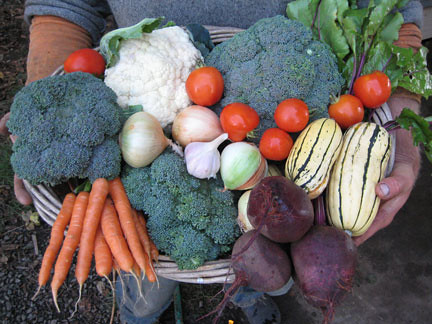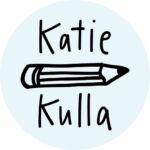(CSA Newsletter: Week 35)
Meet this week’s vegetables:

Recently, I had the pleasure of reading two new books that both focus attention on the energy consumption habits of our culture and how they can change. The books each take very different, equally interesting approaches to the question of conservation — both were thought provoking enough that I wanted to share a bit about them with you all here.
The first book I read, $20 Per Gallon: How the inevitable rise in the price of gasoline will change our lives for the better, brings a uniquely optimistic angle to the question of future ‘peak oil’ (the time when oil production will begin to decline for the first time in industrial history). The author, Christopher Steiner, walks readers through a theoretical analysis of how our world will change for the better as gasoline prices rise. Each chapter focuses on a $2 increase and explores different elements of ‘inevitable’ changes: transportation, home energy usage, food, etc.
I enjoyed the unique positive tone for such a big important topic. So often discussions of fuel consumption are, quite honestly, a big downer. It was fun to hear Steiner (and the many researchers/experts he interviews along the way) share the good news about how peak oil will change our lives. According to Steiner, we’ll live closer to our families; people will drive less (and consequently be more fit); air will become cleaner; local food will prosper; etc.
About halfway through the book, however, Steiner became increasingly speculative (the price being farther and farther into the future), and eventually the optimistic tone started to wear thin. Steiner puts a lot of faith in American federal and state governments’ ability to act when necessary. Maybe there will be a big reinvestment in mass transit when gas prices go up, but it’s hard for me to believe that today. Also, I imagine there will be a lot more pain and difficulty at every price increase than Steiner allows for in the scope of his book’s project.
Obviously, Steiner has tackled a very huge topic in this book. His findings are interesting, but hardly conclusive. Casey (who also read the book) and I agreed that the reality will be infinitely more complex than could ever be addressed by one book. While Steiner does a fairly good job addressing some of the complexities of things like transportation, manufacturing and food production are more or less glossed over — and both will be changed in incredibly complex ways as petroleum prices increase. Plus, I still can’t stomach his conclusion that nuclear power is the only safe, clean power for our future.
The second book, by Colin Beavan, features a long title: No Impact Man: The adventures of a guilty liberal who attempts to save the planet and the discoveries he makes about himself and our way of life in the process. As the title implies, Beavan’s take on conservation is a personal one. His book is the latest in a recent spat of one-year personal adventures. This new non-fiction genre has been popular over the last few years, especially for writers exploring questions of conservation and environmental living (eating locally for one year, for example) but also for other topics as well (living ‘biblically’ for one year, for example). Even though it’s almost becoming a cliché, I still find myself enjoying these books, simply because they offer incredibly intimate, focused glimpses into very smart, thoughtful people’s lives.
Beavan’s book is one of the best I’ve read on personal environmental choices. He and his family live in New York City and commit to living for a year in a manner that makes no impact on the planet — or, at least as little impact as possible. To that end, they make some extreme lifestyle changes along the way: they give away their television, stop creating trash, eliminate all disposable items from their life, travel only by human power (no subway!), eat locally and organically, stop buying anything new, and eventually even shut the electricity off in their apartment.
Beavan’s descriptions and analysis of the year are some of the most thoughtful I’ve ever read. He manages to tell their story humbly and with a high level of self-awareness. Noting that much of our American lifestyle either pollutes or needlessly wastes resources, Beavan continually questions whether those aspects of our lifestyle bring us proportional happiness. If not, then how can we achieve happiness without simultaneously polluting and wasting resources? It’s a very simple but powerful question, one which should be brought to everyone’s attention immediately. I found his analyses thought provoking, and I’ve been considering what aspects of our already simple lifestyle might fall into the category of ‘wasteful and not happiness producing.’
My only gripe with Beavan’s book (besides the fact that he never revealed what his family uses in place of toilet paper — I genuinely want to know!) is some of his discussion of food issues. He and his family make some awesome changes in their diets, but along the way he repeated the increasingly clichéd ‘new truths’ about local vs. organic. Specifically, there was a brief but powerful dismissal of organic certification as being ‘meaningless.’ I’m sick of this statement, because I fundamentally do not believe it is true.
I can (and will) write an entire essay addressing this point, but suffice to say here: I believe that if an author interviews a small farmer extensively about why he is not certified organic, it is only fair to also interview another small farmer about why he is certified organic. Certified organic small farmers have been given almost no voice in recent books addressing this topic, and yet we make up possibly even half of the natural-minded small farming community. From reading Beavan’s book (along with Michael Pollan’s The Omnivore’s Dilemma and others), you’d think all small direct-marketing local natural-minded farmers were eschewing certification, which is just not true. This oft repeated notion is a personal pet peeve of mine, but it also means that these books often unwittingly misrepresent the certification standards and process.
For example, in Beavan’s book he quotes a dairy farmer as saying he isn’t certified organic because if he were he would have to send sick cows to slaughter rather than treat them with antibiotics … this is not true at all!!!!!!!!! In fact, certification standards mandate that farmers treat their sick cows. Again, my point being that certified organic small growers have an important opinion about the word ‘organic’ and certification that really should be allowed in on the debate — especially since they are often more informed and experienced with the reality of the process and the standards. (Ok — end of rant.)
Again, this organic food thing is a minor point in an otherwise highly readable, thoughtful, informative book. I’d recommend either book to someone looking for an enjoyable read on the very serious subject of our lifestyle and its environmental impact, but I especially recommend No Impact Man, because of how immediately applicable it is to all of our personal life choices.
And, of course, now that it’s really truly fall (fog in the morning! cool nights! a little bit of rain!), it’s a perfect time to curl up with a book and a cup of tea … and also a perfect time to roast beets, broccoli, cauliflower and/or delicata squash. Enjoy this week’s fall vegetables!
Your farmers, Katie & Casey Kulla
P.S. Thanks for your flexibility this week! We know that we weren’t scheduled to switch locations until next week, but circumstances required us to move earlier than we’d expected. Thank you for flexibility this week in adjusting your routine. We hope that everyone made it to the YCAP food bank just fine to pick up this week’s delicious share of fall vegetables!!!!!!! Also, once again: a big HUGE thank you to both First Baptist Church and the YCAP Food Bank for hosting us again this year.
Final CSA open house of the year!
2-4 pm, Sunday, October 25
Put the date on your calendar now! Our final CSA open house of 2009 is coming up: Sunday, October 25. This is our special ‘pumpkin patch’ open house, where everyone (who wants to) can pick a big orange jack-o-lantern pumpkin to take home. We’ll also have treats to snack on and be giving field tours.


